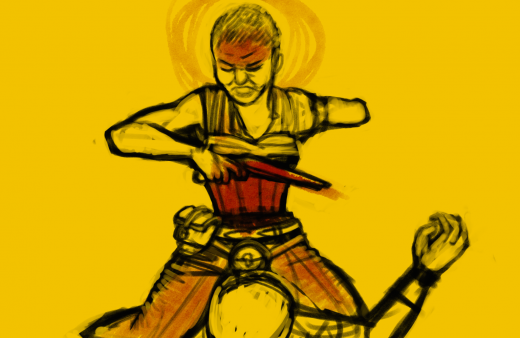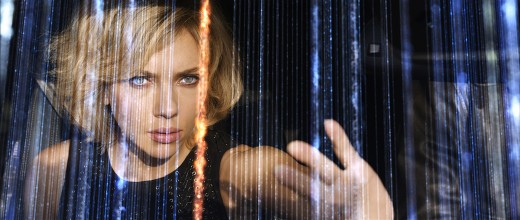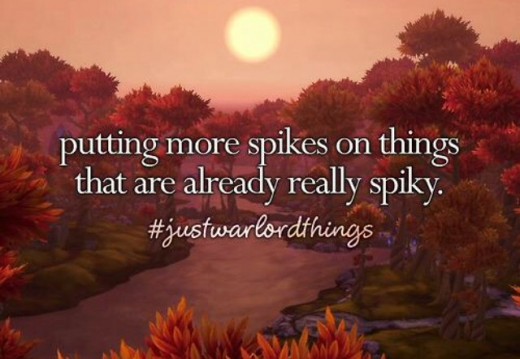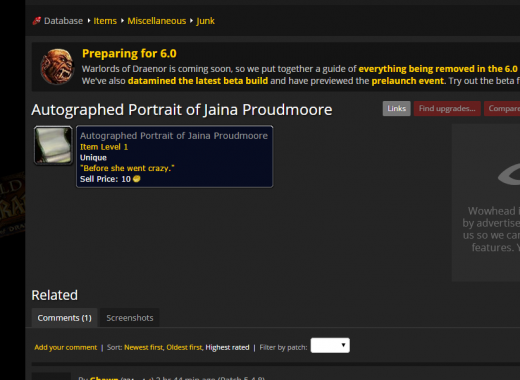
I was really surprised that I liked this film so much.
As The Spectacle
I have not seen a Mad Max film in a very long time. The hype for this movie snuck up very quickly and so did the previews; one day it was not here and then the next, one could not escape from it. I was not convinced but as more and more of my friends started chattering about how excited they were to see it, I thought that it would be in my best interests to do so. The word “feminism” was coiling around the initial salvos of press and that’s what really ensnared me: could an action movie really do that? I still felt hesitant, because for as much as I consider myself a feminist media critic, I am allergic to the idea that a piece of media can truly be part of some “feminist”/”not-feminist” binary.
One of the first waves of criticism I heard was about how the film was pretty and truly well stocked with white people, despite this being post-societal collapse Australia. It is pretty common at this point to see fantasy and sci-fi movies neglect that the future will most assuredly contain people of color, so I was a bit dismayed.
However, before I could really ruminate on what the movie might possibly be doing, suddenly it was everywhere: MRAs were up in arms about this shit. It’s like the entire nerd portion of the Internet got a fire under its ass and demanded that we go watch this movie. It was our duty to go see this film! Won’t it piss off those backwards misogynists who think this film is carrying some subversive feminazi propaganda! It will be the feminist film for the ages! Any and all other criticism of what this movie might be selling was instantly extinguished and it felt like a banner for Feminism being waved around.
I didn’t feel those sentiments exactly, as I penned that day of seeing Mad Max: Fury Road in theatres:
I find people (a lot of them ally men) becoming engrossed in punking more sexist/MRA men really gross. It turns away from wanting to elevate feminist discourse and turns it back around to power dynamics by two marginally different groups of men, separated by slight ideological gulfs. This division being made to the tune of millions of dollars that goes back into the pockets of mostly male movie execs and producers doesn’t liberate anyone, really: it doesn’t guarantee that movies will take more risks in the future, that more WoC actresses will be hired, more female directors will get their projects green-lit and backed. The way to progressive media is not that we have to “buy in” with our participation. It is a pretty performative and meaningless gesture.
In the last couple of months, I’ve really shied away from the kind of feminist act that is purely oppositional; I don’t do what I do as a critic or a woman because it will piss off men, I do what I do to speak and live my truth. It benefits no one but other men, in this instance, to fork over money so that some group I do not talk to will be angry in spirit. Men will always be angry. A movie does not change this, nor does it drive my politics.
I was also extremely hesitant to buy into the idea, as I stated before, that this was a noble, feminist act, that this was a purely feminist film. While it might have some effect in Hollywood by showing that these kinds of films with the bare minimum of respect for women characters can be profitable, overall the world is as it is. My soul is restless at the idea that money can truly buy progressiveness.
(I found out that Eve Ensler consulted on the film as well, with regards to how women react in war-torn countries, for accuracy. Eve’s own politics veer very far from mine and I find her methods and treatment of many groups like trans women and women of color to be incredibly violating and distasteful. But I digress.)
As The Film
From the moment the first shot opens until this movie closed, I could feel myself not breathing.
This is an action movie of the highest order and it puts so many others to shame. We have been truly wandering in the desert up until this point - in terms of epic (actually epic, Odyssey-epic, sweeping epic) film-making and story, there’s very few others I’ve seen that attain a pure crystallization of vision. The film does not burden you with much dialogue and exposition. It is a tale of going there and back again, writ against the struggles of Max as he wrestles his demons and the Wives, under Imperator Furiosa’s care, attempting to gain escape velocity behind the wheel of a war rig.
The cinematography was sweeping, allowing for moments of delicate close-up shots of Furiosa’s face, wide-angle desert pans and action that danced, clear and lucid on the screen. At no point was I confused about what was going on, and the use of movement in among all of the vehicles was spectacular. What the movie did the best was that excellent sense of vertical space: everything loomed large, whether unseen or all-too-close in the rearview. What also shone was the stunt work and prop design - from the very real flame-throwing guitar to the polecats men that wove in and out of shots.
The story was kept bare and allowed you to hyper-focus on the characters in the moment and on their impossible journey. Max is laboring under the sins of his past, and Furiosa is looking for redemption: for herself as well as the young women she wanted to save. All that we need to know is that they must get away, and when they do, what comes next is the arc that carries us triumphant across the finish line. The women’s struggles to exist in a world where they are nothing but walking meat felt familiar to me, set very starkly in the world of the film. Not knowing exactly how this world came to be made it easier to focus on what it was trying to say. Max and Nux are two men attempting to be their own true selves but unsure of what that means when their roles are so tightly defined at the beginning of the film and in the end, are allowed to be heroic and compassionate. Their sacrifices and bodily nurturing flips much of the action hero archetype on its head, and allows the women space to enact violence and empathy on their own terms instead of being on the sidelines to Max’s pain.
It’s been a long time since a movie has taken hold of me so strongly that I find myself laughing aloud at points, clapping or hooting and hollering from the back rows.
As The Work
The one thought that really itched at the back of my brain and made its way onto Twitter after I had seen the film was this: this would have been better as a film that wasn’t about Mad Max. The sparseness of story and his own participation as the point-of-view just made me realize that I would have really liked to have seen this from Furiosa’s perspective. Obviously, her ascension through the ranks is alluded to but it speaks to many questions: why is she not part of the base classes of thirsty people around the plateaus? She’s certainly not “fit” to be a wife or a milk mother and yet all of the war boys seem to be men. I would have liked to see this movie from her perspective, a heist movie of the highest order. Having Max’s titular story be draped on top of hers, rather than a supporting lead felt like the less attractive option. I know it is a franchise but I just think it would have leaned even further into showing that this world’s women had much more interesting stories to tell.
This is where I find the idea that this movie is “feminist” to be a really erroneous take. Does it have merit from a feminist critical lens though? Absolutely. As a work, it grapples with a lot of things that I find both add and subtract from my enjoyment of it, as a feminist.
The criticisms that the movie was dominated by white actors is absolutely on the nose, to almost literal effect. While there were a few people of color in the supporting cast, the story is surrounding two or three white characters in a world that also feels similarly white. I think it’s incredibly lazy to constantly create futuristic sci-fi worlds, especially dystopias that reproduce the plights of underclasses and marginalized people (resource scarcity, slavery) and making them completely about white people.
As far as the way the Wives and Furiosa were portrayed, I felt that overall, it was pretty strong. Each were given a least a touch of their own personality and way of dealing with things: confusion about the outside world, pleas for pacifism and compassion. The struggle among them over whether to give in and go back to Immortan felt too real in terms of what happens when trying to escape an abusive relationship, but the fact that they didn’t shit all over Cheedo for attempting to do so was a nice touch (the fact that this is later mirrored in her part to help kill Immortan was especially poignant.) I also loved the inclusion of the Many Mothers clan, while decimated, they were still glorious as well as key to the eventual survival of the entire group.
The violence in this film and seeing Furiosa save the day time and time again by the skin of her teeth, shooting guns and stabbing fuckers in the face, all while driving the war rig was thrilling to me. I know women enacting violence is going to be the biggest battleground over the ideology of this film and I have mixed feelings about it. On the one hand, violence is not a masculine pursuit, solely. There is absolutely fuck-tons of masculinized violence in this movie and I feel that there needs to be a difference in looking at using violence as a survival mechanism (which is something Max does, repeatedly) and violence as a subjugation tool. The War Boys are looking to destroy the uppity women attempting to leave, and grind them back into their place. It is about conquest and attempting to correct a theft: the wives are property. What all of the women in this movie are attempting to do is to not even just get revenge (though that factors in) but to get away with their lives and their bodily autonomy. I couldn’t help but feel a stirring in my heart when Immortan Joe’s body was ripped apart because that darkness has been in my body for most of my life. We have to allow women who have been victimized this truth.
The flip-side of this however is when I saw the people claiming that this violence is what made it the most feminist without critical looks into what violence actually was doing in this movie. Frequently, violence from white women is seen as the ultimate power one can attain after being seen as weak and feminine. However, both this delicacy, prized and pure as well as the ability to enact violence is open to only white women. If Furiosa had been black or brown, I feel like the reactions would have been very different. It would have not been hailed as the second coming of feminist films.
All that being said, there was still something potent in seeing it, especially in a world that was set up to still continue the treating of women’s bodies as property, taken to a very scary conclusion. It always saddens me when we keep seeing bleak futures in this way and gives me a lack of escapism. While I felt that the film ultimately balanced the grossness of women-as-livestock metaphor with the tenderness of the main players with eachother, one day maybe we will see visions of the future where women are not crushed beneath the boot of Men, if not forgotten entirely from the world.
If there was any one thing that gave me a small bit of hope that we can achieve this, was seeing Max give his blood to Furiosa so readily. A man putting aside his own needs to help and comfort the woman whose crusade drove the entire plot almost made me cry. It was well worth the price of admission.

 I’m going to lay it out here: Lucy is a terrible fucking movie. It barely has merit as a film at all. It’s much like
I’m going to lay it out here: Lucy is a terrible fucking movie. It barely has merit as a film at all. It’s much like 

